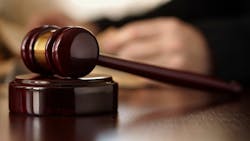Abbott Wins in $1 Billion Trial Over Stent Marketing
Abbott Laboratories didn’t cause medical providers to submit false payment claims to Medicare for unapproved stents, a Texas jury ruled, thwarting a whistle-blower’s lawsuit seeking as much as $1 billion.
Kevin Colquitt, a former salesman for Abbott’s predecessor Guidant, claimed the company pushed bile duct stents that were intended for short-term purposes for more complex vascular use. Colquitt filed the lawsuit in 2006 on behalf of the U.S. government, accusing the company of encouraging doctors and hospitals to falsely code bills to Medicare.
Abbott (IW 500/57), which acquired Guidant’s stent business in 2006, denied during the trial in Dallas federal court that it induced anyone to submit false claims to Medicare. Its lawyers told jurors the use of biliary stents for peripheral vascular or arterial disease was accepted medical practice and Medicare knowingly approved payments.
“This verdict supports a decade’s-long, generally accepted medical practice that benefited tens of thousands of patients,’’ Elissa Maurer, an Abbott spokeswoman, said in an e-mail Thursday. “We’re pleased with the jury’s decision.
Colquitt was seeking $219.4 million in damages, to be tripled under the U.S. false claims law. He also sought penalties of as much as $11,000 for each wrongly coded bill submitted to Medicare from Feb. 23, 2004, to June 21, 2006, for 35,297 claims. Any damages would have gone to the U.S., with Colquitt receiving a share.
Chris Hamilton, Colquitt attorney said he will appeal. “We believe the evidence supports a finding that Abbott knowingly marketed and billed Medicare hundreds of millions of dollars in stents for unapproved uses that were not eligible for reimbursement under the rules,” he said.
Significant Off-Label Stent Use
Colquitt claimed that the Abbott stents weren’t eligible for Medicare reimbursement because they hadn’t been approved for vascular use. Abbott used so-called off-label marketing to test the devices on patients without their informed consent, he contended.
While doctors are allowed to use medical devices as they see fit, the manufacturers can only market them for uses approved by the U.S. Food and Drug Administration. Abbott’s push for off-label use of the stents included sending letters on behalf of doctors to potential patients and teaching hospitals and physicians how to code bills to get Medicare reimbursements, Colquitt alleged in the trial.
Medicare paid with full knowledge biliary stents were being used as the standard of care.’’— James Hurst, lawyer for Abbott
The trial covered some of the products at issue in Abbott’s $5.5 million settlement with the U.S. in 2013 over kickbacks paid to doctors to use stents.
About 99% of the bile-duct stents the company sold from 2004 to 2006, the period covered by the suit, were used off-label, according to an Abbott expert’s testimony, court papers show. The claim of off-label marketing wasn’t before the jury, though U.S. District Judge Barbara Lynn allowed evidence on its connection to the medical providers’ actions, according to the court’s jury instructions.
“The defendants had no clinical trial data that their devices were safe and effective,’’ Hamilton said in his closing arguments Thursday. “They didn’t start a clinical trial. They never attempted a clinical trial.’’
“Medicare does not assume a device is safe and effective. You have to have the evidence,’’ he said.
No Medicare Fraud
“There was no Medicare fraud,’’ James Hurst, Abbott’s lawyer, told the jury Thursday. “Medicare paid with full knowledge biliary stents were being used as the standard of care.’’
Medicare reviewed the issue in 2008, after Colquitt’s lawsuit was filed, and made no change in coverage, continuing to pay for biliary stents, Hurst said.
“If the government believed there was fraud, wouldn’t you think they’d stop paying?’’ he asked. “No, they didn’t, year after year.’’
Colquitt testified March 25 that he filed the lawsuit after two Guidant stents were recalled.
“At first I believed in the product,’’ Colquitt testified. “I went out and sold them enthusiastically. But over time there were a couple of incidents.’’ He said he never made sales calls to doctors who might use them for bile duct procedures, selling almost exclusively to physicians who would use them for vascular procedures.
Colquitt began going to law school while selling the stents, where he learned about the U.S. False Claims Act. When the second Guidant stent he was selling was recalled, he said, “I thought I should contact an attorney.’
Abbott’s lawyers suggested another motive for the lawsuit. Colquitt would get 25% to 30% of any reward, Abbott lawyer Andrew Kassof pointed out in his cross examination of the whistle-blower. That could amount to “over $50 million to you,’’ Kassof told Colquitt.
The stents were safe and effective, Hurst, the Abbott lawyer, told the jury Thursday.
“Doctors demanded the latest and best technology for their patients,’’ he said. “There is no question biliary stents provided the latest, cutting-edge technology.’’
Nearly all the patients who received the stents were elderly, and attorneys with the AARP Foundation litigation unit joined the lawsuit in 2010 as co-counsel against Abbott. The organization is “extremely disappointed by the jury’s verdict both for our client Kevin Colquitt and for the beneficiaries of the Medicare program,” said Kelly Bagby, a lawyer for the group.
About the Author
Bloomberg
Licensed content from Bloomberg, copyright 2016.
